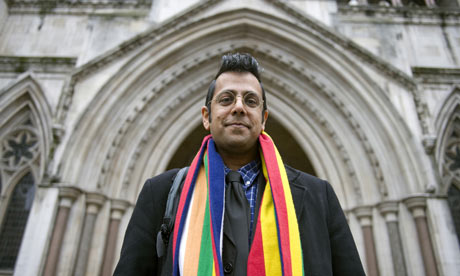
It's a subject of grim amusement among scientists that while it is perfectly acceptable for wrinkle creams to claim to be "inspired by the science of genes" (whatever that means), real discussion of scientific process and results could result in a lawsuit.
Scientists are trained to do their battles in public, with disprovability and reproducibility as guiding concepts. Their standard is already higher than much of the rest of public discourse; by definition it has to be.
Simon Singh was sued for libel by the British Chiropractic Association over an article that suggested there was a lack of evidence for the claims over colic, asthma and other conditions. Singh's original statement was judged lawful in a ruling on the appeal on Thursday … at an expense to him of over £200,000.
What the case came down to was the meaning of a few words – did Singh's statement allege that the BCA was purposely misleading people? It is having to consider the possible interpretations of the readers that makes skirting libel law so frightfully difficult, as well as unclear.
Singh has described the ruling as "brilliant" – and it is, because in such a high-profile case, this could set precedents. But it doesn't go far enough.
On Tuesday night, MPs rejected a libel reform proposal. The sticking point was the "no win, no fee" deals in libel cases that would reduce the "success fees" imposed on the losing side from 100% to 10% of costs. Justice Secretary Jack Straw has said he remains "hopeful" of a turnaround before the general election, but libel reform supporters are doubtful that the issue will be resolved in this parliament.
While the changes Straw put forward did not go as far as libel reformers would like to see – cracking down on "libel tourism" seemed particularly weakly supported – any advance on the arcane system now in place would be seen as improvement. The perfect, as ever, is the enemy of the good. While Labour MPs rebel over a proposal that was expected to be nodded through, others could find themselves in Singh's position. There are still a number of libel cases in the pipeline which many scientists fear could have a chilling effect on what they say.
Just last week, I attended a public health conference in Valencia where a noted doctor, Philippe Grandjean, railed against scientists who are "too polite" in publicising the results of toxic chemical studies. This caution could, he warned, lead to "silent epidemics" of negative health outcomes. Sadly, many of us operate in a world where politeness is actually a proxy for fear.
Threats of libel action have a real effect on research. Whether it's critics of lie detector technology who fear a lengthy and expensive case if their study results are challenged, or a cardiologist being sued by a medical technology company, there are examples that go wider than Singh's case. The effect on the right of scientists to publicly debate results and the implications of those results is clear.
Of particular interest is Paragraph 34 of Lord Chief Justice Lord Judge, Master of the Rolls Lord Neuberger and Lord Justice Sedley's ruling on Singh's case. It quotes the judgment in a US court of a science and libel case, Underwager v Salter:
"[Plaintiffs] cannot, by simply filing suit and crying 'character assassination!', silence those who hold divergent views, no matter how adverse those views may be to plaintiffs' interests.
"Scientific controversies must be settled by the methods of science rather than by the methods of litigation […] More papers, more discussion, better data, and more satisfactory models – not larger awards of damages – mark the path towards superior understanding of the world around us."
The idea that loss of reputation has such a high perceived monetary effect on the accused is a difficult notion to brook in the modern age. After all, reputations are formed and reformed by the near-constant barrage of information available to us every day. If Einstein could take Bohr's criticisms of relativity in his stride, than surely the rest of us can as well.
There is nothing wrong with requiring a high standard of proof in public statements. Libel laws should exist in some form to protect against blatantly untrue damaging statements. However, where the standard is applied unequally, and very much favours the accuser over the accused without regard for scientific process, it does raise the question of whose interests are being served.

